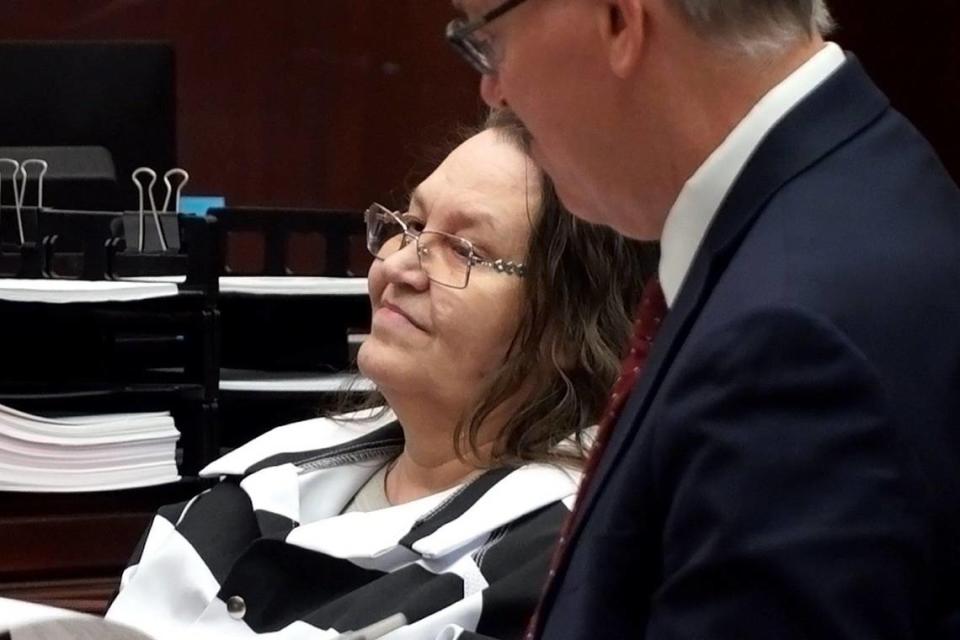Clay County jury convicts Viola Bowman of fatally shooting her husband in 2012
A Clay County jury on Monday convicted Viola Bowman of murder in the 2012 fatal shooting of her husband in their Kansas City, North home.
Bowman, 60, was found guilty of first-degree murder and armed criminal action in the killing of Albert “Rusty” Bowman, whom firefighters found covered in blood in his recliner Nov. 7, 2012, at 5530 N.E. Munger Road.
Prosecutors accused Bowman of carrying out the shooting and staging the scene to look like a break-in. Bowman maintained her innocence and said she found her husband with gunshot wounds when she returned from the store that day.
Nearly two years after the homicide, police took Bowman in for questioning and let her go. She was then arrested in January 2015 and had been in jail awaiting trial for more than six-and-a-half years.
As the verdict was announced, one of Bowman’s supporters gasped and cried in the courtroom. Afterward, her attorney, Horton Lance, consoled Bowman as she quietly sobbed.
Relatives of the victim declined to comment following the verdict.
In November 2019, Bowman’s case was highlighted in a Star investigation that found the state public defenders system routinely fails poor defendants by providing inadequate representation that falls short of constitutional guarantees. Her case had been delayed dozens of times as public defenders struggled with overwhelming caseloads.
Last year, Bowman rejected a plea deal that downgraded the murder charge to voluntary manslaughter. The deal included a five-year sentence with credit for time served, meaning Bowman could have been released had she accepted the offer.
But she told a judge, “I did not do this.”
A trial began in October, but ended because of potential COVID-19 exposures involving a juror and court staff member. A mistrial was declared.
During the trial that started last week, assistant prosecuting attorney Spencer Curtis said Bowman fired two rounds at her husband, striking him in the head and the chest. Prosecutors said she benefited from a life insurance policy and claimed statements she made to police were “rife with inconsistencies.”
Bowman allegedly told first responders that she had been at Walmart and that someone had broken in. However, items like a laptop, car keys and a wallet had not been stolen, prosecutors said.
Bowman’s attorney said she loved her husband of 35 years. She was at Walmart during the shooting, buying items to make caramel apples, and when she arrived home, she encountered the most “traumatic, terrifying event of her lifetime,” he said.
She cooperated with police and had no criminal record, Lance told jurors.
At trial, the jury listened to audio of a frantic 911 call made by Bowman. “Hurry,” she said. “There’s blood everywhere.” The dispatcher asked if he was breathing, and Bowman said she could not find a pulse. The dispatcher helped her start chest compressions.
Prosecutors repeatedly described Bowman as exhibiting “odd” behavior when she spoke to first responders.
Lisa Malloy, who responded to the scene as a captain with the Kansas City Fire Department, testified that Bowman’s 911 call was “strange” and said her reaction was not like others she had seen in her years of responding to emergencies.
Experts with a background in law and psychology told The Star they questioned the objectivity and depth of the prosecution’s statements characterizing Bowman’s behavior, citing common trauma responses.
Elizabeth Vermilyea, a consultant specializing in traumatic stress, said “odd” is a subjective assessment. Immediate reactions can range from numb to disoriented or hysterical.
”The problem with immediate and delayed reactions to trauma is that there’s no formula,” she said.

 Yahoo Movies
Yahoo Movies 


